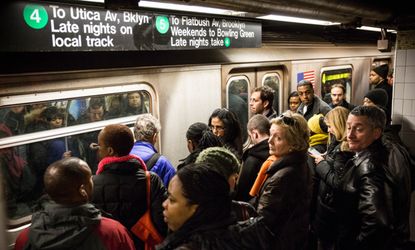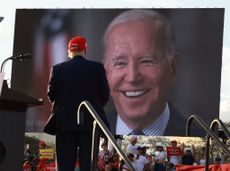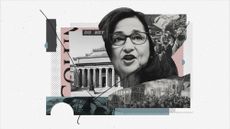How the U.S.'s obsession with cars is hurting the middle class
An institutional bias against public transit is squashing economic mobility and job creation


Undercut by the massive expansion of America's highways and the rise of suburban sprawl, public transit ridership dwindled for decades starting around the 1950s. But in recent years, that trend has gradually begun to reverse, such that ridership is now higher than it has been since 1956.
This is an extremely positive development, but additional funding will be needed to meet demand. A resurgence of mass transit would, as has been well-documented elsewhere, ease traffic congestion, reduce our dependence on fossil fuels, decrease dangerous emissions, and improve public health. But there's another less intuitive reason why states, cities, and the federal government should start pumping more money into transit projects — and it has to do with the middle class.
Investments in public transit would most directly benefit members of the middle and lower classes because they make up by far the biggest share of riders. Almost two-thirds of all transit riders made under $50,000 in 2007, according to a report from the American Public Transportation Association; only 9.5 percent of riders made more than $100,000.
Subscribe to The Week
Escape your echo chamber. Get the facts behind the news, plus analysis from multiple perspectives.

Sign up for The Week's Free Newsletters
From our morning news briefing to a weekly Good News Newsletter, get the best of The Week delivered directly to your inbox.
From our morning news briefing to a weekly Good News Newsletter, get the best of The Week delivered directly to your inbox.
But public transit budgets haven't kept pace with resurgent ridership, and the recession only further eroded funds that were already dwindling. Take New York's Metropolitan Transportation Authority. In 2007, it took in $1.6 billion from real estate taxes; it earned less than $400 million from the same source two years later.
Budgetary problems usually manifest themselves as either service cuts or fare increases. A 2011 APTA report found that nearly 80 percent of transit systems in 2010 took at least one of those actions due to funding concerns. And just as improvements to public transit mostly impact the middle class, so, too, do negative service changes. Indeed, the erosion in the middle class' share of overall income correlates neatly with a reduction in federal infrastructure spending.
Fare increases are particularly problematic. For an average American family, transportation expenses rank second only to housing costs — meaning we're spending more on transportation than on food. Middle class families spend a greater share of their income on transit than other income groups, too. And for the bottom 90 percent as a whole, transportation costs consume one of every seven dollars of income, according to Treasury Department estimates.
Dumping more funds into mass transit could alleviate the burden of transportation costs. Between 2000 and 2009, median income families living in areas with diverse transportation options saved $200 per month in transportation costs compared to similar families in less-transit-friendly areas, according to the Department of Housing and Urban Development.
Sign up for Today's Best Articles in your inbox
A free daily email with the biggest news stories of the day – and the best features from TheWeek.com
Adding more train cars and expanding access would also cut down on commute times for dedicated straphangers, potentially upping their productivity. And through increased ease of mobility, transit-dependent workers could gain access to more — and better — job opportunities. As many studies have shown, cities with strong investments in public transit tend to have much greater economic mobility, a link that holds up even when other contributing factors are stripped out.
Moreover, the lion's share of economic activity created by pouring money into mass transit would go to the middle class. A 2012 Treasury report concluded that 80 percent of the jobs created by infrastructure investments — not only in public transit, though that would make up a great deal of the investment spending — would go to three sectors: construction, manufacturing, and retail trade. Of those jobs, 90 percent would be expected to offer middle-class wages.
Now, critics may claim that it doesn't make sense to throw money at a mode of transport used by under 40 percent of all commuters. Isn't that a little unfair — redistribution-y, if you will?
But we already have a deeply biased transit system tilted in favor of driving. Car commuters enjoy all sorts of tax breaks, artificially cheap gas — prices in Europe are often double those in the States — and funding schemes that heavily subsidize driving. And due to congressional inaction last year, a public transit commuter tax credit will be cut almost in half, costing some commuters more than $1,000 annually.
As Alex Pareene astutely remarked last year, "Finding a steady and sufficient revenue source for the local transit system...should be an urgent priority for local politicians, but most of them simply don't care."
We already have a political system in this country that, nationally, heavily favors the interests of the rural and the suburban over the urban. Many state legislatures have similar biases. But when, even in New York, politicians ignore transit, because they don't know or interact with or receive checks from people who rely on it every day, there's almost no hope for cheap, efficient mass transit options anywhere." [Salon]
Supporting mass transit would cut middle class expenses, boost economic mobility, and create a bounty of middle class jobs. Lawmakers may not be so keen on the idea now, but as transit ridership increases, they may ultimately have little choice.
Create an account with the same email registered to your subscription to unlock access.
Jon Terbush is an associate editor at TheWeek.com covering politics, sports, and other things he finds interesting. He has previously written for Talking Points Memo, Raw Story, and Business Insider.
-
 'Voters know Biden and Trump all too well'
'Voters know Biden and Trump all too well'Instant Opinion Opinion, comment and editorials of the day
By Harold Maass, The Week US Published
-
 Is the Gaza war tearing US university campuses apart?
Is the Gaza war tearing US university campuses apart?Today's Big Question Protests at Columbia University, other institutions, pit free speech against student safety
By Joel Mathis, The Week US Published
-
 DOJ settles with Nassar victims for $138M
DOJ settles with Nassar victims for $138MSpeed Read The settlement includes 139 sexual abuse victims of the former USA Gymnastics doctor
By Justin Klawans, The Week US Published
-
 Arizona court reinstates 1864 abortion ban
Arizona court reinstates 1864 abortion banSpeed Read The law makes all abortions illegal in the state except to save the mother's life
By Rafi Schwartz, The Week US Published
-
 Trump, billions richer, is selling Bibles
Trump, billions richer, is selling BiblesSpeed Read The former president is hawking a $60 "God Bless the USA Bible"
By Peter Weber, The Week US Published
-
 The debate about Biden's age and mental fitness
The debate about Biden's age and mental fitnessIn Depth Some critics argue Biden is too old to run again. Does the argument have merit?
By Grayson Quay Published
-
 How would a second Trump presidency affect Britain?
How would a second Trump presidency affect Britain?Today's Big Question Re-election of Republican frontrunner could threaten UK security, warns former head of secret service
By Harriet Marsden, The Week UK Published
-
 'Rwanda plan is less a deterrent and more a bluff'
'Rwanda plan is less a deterrent and more a bluff'Instant Opinion Opinion, comment and editorials of the day
By The Week UK Published
-
 Henry Kissinger dies aged 100: a complicated legacy?
Henry Kissinger dies aged 100: a complicated legacy?Talking Point Top US diplomat and Nobel Peace Prize winner remembered as both foreign policy genius and war criminal
By Harriet Marsden, The Week UK Last updated
-
 Trump’s rhetoric: a shift to 'straight-up Nazi talk'
Trump’s rhetoric: a shift to 'straight-up Nazi talk'Why everyone's talking about Would-be president's sinister language is backed by an incendiary policy agenda, say commentators
By The Week UK Published
-
 More covfefe: is the world ready for a second Donald Trump presidency?
More covfefe: is the world ready for a second Donald Trump presidency?Today's Big Question Republican's re-election would be a 'nightmare' scenario for Europe, Ukraine and the West
By Sorcha Bradley, The Week UK Published